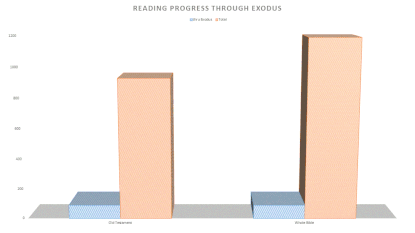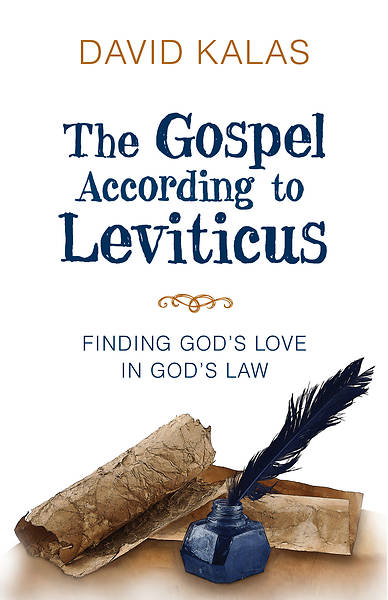Week Four Reading Assignment:
Exodus 20 - Leviticus 2
"This law is an incorruptible picture of the high and holy One who inhabits eternity. It is He whom, in essence, no man has seen or can see, but is now made visible in this way to men and angels. Here is the face of God unveiled. Here is God manifested to His creatures as they are able to bear it, manifested to give and not to destroy life, that they may meet God and live. It is the heart of God disclosed to man. Yes, in some sense, what Paul says of Christ we may say about the law: It is the streaming forth, or out-beaming, of His glory, the express image of His person."
(John Wesley, "The Nature of Holiness")
(John Wesley, "The Nature of Holiness")
This Week's Video: Tour the Tabernacle
making progress
|
This week we will finish reading Exodus, the second book of the Bible. When we do, the chart above illustrates where we will stand in our reading of the Old Testament and in our reading of the entire Bible. Keep up the good work!
|
Good Book Review:
|
The Day the Books Stood StillUp until now, the material we've been reading has moved through time and space. We have been reading stories, you see, and those stories have taken us from Eden to Ararat, from Ur to Haran, from Canaan to Egypt. Those stories have covered many generations -- thousands of years -- from Adam to Noah, from to Abraham to Jacob, from Joseph to Moses.
The story of Moses and the deliverance of the Hebrew slaves takes us out of Egypt, across the Red Sea, and to Mt. Sinai. And once we get to Mt. Sinai, however, things change. The story stops. At Sinai, the people of Israel receive the Law. The familiar Ten Commandments are at the heart of that Law, but they are not the whole law. And even though there is yet within the Book of Exodus a reference to moving on from Sinai, the fact is that the second half of Exodus, the entire book of Levitcus, and the early chapters of Numbers all occur there at Sinai. Some stories are mixed into those dozens of chapters, but mostly the material is "law." And so, while Genesis and the first half of Exodus could be traced on a map or illustrated on a time line, the remainder of Exodus, all of Leviticus, and part of Numbers would all amount to only a dot on each. It's a lot of material, to be sure, but that material does not cover time or space. When you're driving along on a highway, you see signs to indicate that you're entering a new county, some city limits, or a different state. This, then, is the road sign for our reading. For while we will be giving a good deal of thought to the specific elements that make of the Old Testament Law during the coming weeks, we want to start by simply alerting ourselves to the border that we are crossing. You are now entering a different kind of material. We are now reading the Law. |
The Big TenAt the beginning of this week's assignment, we read some of the most familiar material in the Bible: the Ten Commandments. If we grew up in the church, we probably saw some replica of The Ten Commandments in our Sunday School classrooms. Perhaps we also grew up watching the famous Cecil B. DeMille movie of the same name. And no doubt we have since come across a number of knock-off versions of this famous passage: the ten commandments for golfers, for example, or for new drivers, or for moms, or some such.
Because the commandments are so familiar, and perhaps precisely because we have traditionally taught them to children, we have developed a kind of shorthand version of them. For example, the third commandment has often been paraphrased by folks as "don't swear." But is that what it really means to take His name in vain? Or the ninth commandment has often been rendered, "Don't lie." But is that the essence of a commandment not to bear false witness against one's neighbor? The price of familiarity, of course, is neglect. When we think that we already know something (or someone) well, we may stop investing in a discovery process. And so it is with the Ten Commandments. Because they are so familiar to us, we may not have given them much new or recent thought. As we read the material that is identified with Sinai, and as we find those Ten Commandments in their original historical context, let's take the opportunity to reflect on them anew. Specifically, let us embark on an individual exercise to help us clarify our thinking and understanding. Rewrite the commandments in your own words and in their opposite form. By "in your own words," we mean that we should avoid using the familiar vocabulary of "images," "vain," "holy," "honor," "kill," "steal," "adultery," "false witness," and "covet." We will find that the meaning of the commandments becomes richer and more personal for us as we force ourselves to think through them enough to rewrite them. Meanwhile, by rewriting them "in their opposite form" we mean that all of the "do not" commandments should be written as "do" commandments, while all of the "do" commandments should be written as "do not" commandments. In other words, If thou shalt not covet, then what shalt thou do? |

